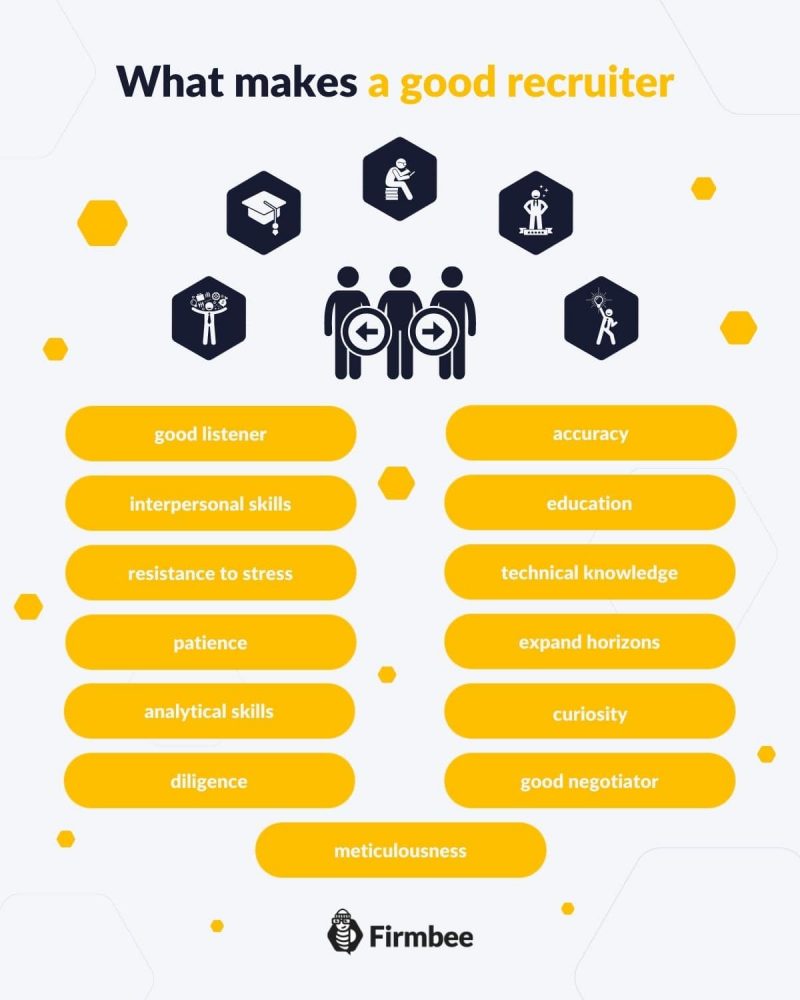What qualities characterize a professional recruiter? What makes a good recruiter? Check out our review and find out if that’s the right career for you.
Good recruiter – table of contents:
Working as a recruiter
At the outset, let’s recognize that this job isn’t for everyone. Some have a false belief it’s a walkover and takes up that career. Others, accidentally up as recruiter having the wrong or no idea what skills and duties go with the profession. It combines marketing, PR and analytical skills and requires many years of learning and development.
Recruiters are responsible for assembling teams of employees, hiring managers or supervisors – having a direct impact on the company’s financial results and market position. They face numerous challenges – the ubiquitous automation of many processes, digitization, remote recruitment due to the pandemic and the ever-increasing demands of candidates – both financial and developmental, just to name a few.
What makes a good recruiter?
Education
Technical knowledge
Desire to develop and expand horizons
Interpersonal skills
Curiosity
Multi-tasking
Analytical skills
Meticulousness
Good negotiator
There are no specific requirements when it comes to education, but a diploma in psychology, sociology, human resource management, management or administration is a powerful asset. Also, a basic knowledge of labor law will certainly come in handy.
The model recruiter should demonstrate substantial technical knowledge and a considerable level of familiarity with the industry of specialization. Indeed, they aren’t a specialist in a particular field but they have a good understanding of the position they find human resources for like its conditions or daily duties. A standard is also the familiarity with industry terminology (especially if he is recruiting in IT, for example).
Combining the hard skills of know-how with soft skills like curiosity, a desire to develop and expand horizons is characteristic of successful employment agents. The HR industry is constantly evolving through new technologies that offer new tools so the recruiters need to educate themselves not only on headhunting but also within the industry in which they operate. It is recommended to read about the industry, attend industry events, participate in various workshops and training, and above all, talk to employees in various positions in the company.
Highly developed interpersonal skills such as coherence, openness, empathy together with the ability to build good lasting relations mark good recruiters. The main part of work involves constant conversation, that’s why they should take satisfaction in contact and talk with people.
They are the ones who chair the conversation during the recruitment process, correctly formulate questions to the candidate, and in case of a shy and withdrawn one, encourage to break the ice, speak up and show off. For these and other reasons, the search agents should also be good listeners – know and use the techniques of active listening, which will avoid communication mistakes.
When it comes to the recruitment process, the employment agent should demonstrate curiosity, a desire to get to know the candidates along with learning as much as possible about them. They should also stay available and in touch with the candidate throughout the whole recruitment process. He must be open to questions from candidates and helpful. A good recruiter answers the phone, replies to asap emails as well as sets up automatic messaging when on vacation or illness to ensure there is no communication breakdown or unprofessional silence.
A lot is going on in the profession of an executive search agent. Resistance to stress, to working under pressure coupled with multi-tasking make the job unsuitable for many. Patience is equally essential, as recruiting the right person is frequently a long and complicated process.
Good headhunters have good analytical skills as their daily tasks require working with plenty of data. An analytical mind facilitates efficient selection of candidates and choosing the best one for a given position.
Accuracy, diligence as well as meticulousness are also indispensable in this profession because apart from the interviews, their job also involves a lot of paperwork and filling out documentation. The ability to plan, set goals and manage time is also useful – good organization of one’s work and focus on the goal may prove crucial in the multitude of tasks and daily duties.
A good recruiter is also a good negotiator. Finding the right candidate is only half of the success, equally critical is negotiating the conditions of employment. The recruiter must find the golden mean between the candidate’s satisfaction with the terms of the contract and the real capabilities of the company.

Summary
Professional recruiters with these characteristics and skills play an indispensable role in the life of the company. Their employment decisions translate directly into the financial performance of the company, the level of candidate experience together with the overall image of the company.
The recruiter is the company’s business card on the market.
Check out our recruiting software for HR and manage your recruiting processes and hiring teams with one tool. Recruit more employees with less effort.
This may interest you: How to manage freelancers?.
If you like our content, join our busy bees community on Facebook and Twitter.
Author: Nicole Mankin
HR manager with an excellent ability to build a positive atmosphere and create a valuable environment for employees. She loves to see the potential of talented people and mobilize them to develop.


















